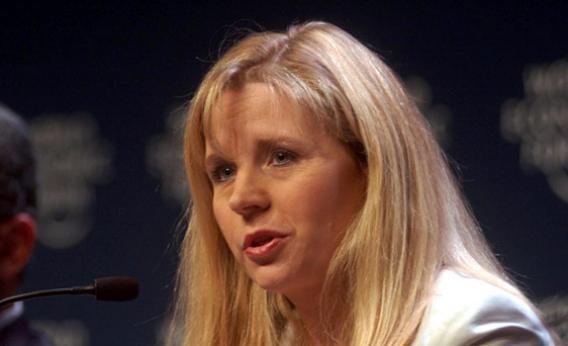Near the end of March 2010, as Republicans outside Kentucky realized that Rand Paul might actually become a senator, Paul’s opponent received an unexpected and important-looking endorsement.
“I’m a lifelong conservative, and I can tell the real thing when I see it,” announced Dick Cheney. “I have looked at the records of both candidates in the race, and it is clear to me that Trey Grayson is right on the issues that matter—both on fiscal responsibility and on national security.”
Paul’s campaign was half-unsurprised, half-amused. They’d seen this coming a week before, when former Cheney policy adviser Cesar Conda emailed some fellow neoconservatives and asked them to “help us get the word out about Rand Paul’s troubling and dangerous views on foreign policy.”* Fun on its own, but by weighing in personally, Cheney had confirmed a white-knuckle panic among their least favorite Republicans. The Louisville Courier-Journal ran a cartoon about the news, in which two Kentuckians learned that Cheney (represented by Darth Vader) had endorsed Paul’s opponent. “On purpose?” asked one of the cartoon characters.
That joke rocketed around the inboxes of Paul campaigners. They kept on laughing, as Paul rose from a 15-point lead before the Cheney announcement to a 23-point “Randslide” on primary night. Their hard-won confidence explains why Sen. Paul came out so early against Liz Cheney’s candidacy in Wyoming, nearly a week before she actually announced it. “I don’t know much about her or her politics, really,” he said—a totally unbelievable statement that could only be read as dismissive. That reading was rewarded yesterday, as Paul claimed that when he “heard Liz Cheney was running for Senate I wondered if she was running in her home state of Virginia.”
Reporters looking for a feud between the Cheneys and her new foe Sen. Mike Enzi have come up a little short. Enzi’s not enjoying the challenge, but he’s known the Cheneys for decades and he’s gone fly-fishing with the paterfamilias. The real “feud” is between the ascendant America-first Republicans represented by Paul, and the conservative hawks who’ve lost their leading role in the party.
It’s not that the neoconservatives have disappeared, exactly. Conda, who tried to organize that late anti-Paul surge in 2010, is now chief of staff to Sen. Marco Rubio. (He chose not to comment for this story.) Jamie Fly, who co-founded the hawkish Foreign Policy Initiative with Bill Kristol—right around the time Kristol founded “Keep America Safe” with Liz Cheney—is now Rubio’s counseler on foreign policy. But Rubio’s star has faded this year, and he regularly polls behind Paul in 2016 ballot tests for a Republican primary. Sens. John McCain and Lindsey Graham, the most reliable hawks in the Senate, cause burning sensations for conservatives on … basically everything else.
Liz Cheney doesn’t have those problems. Like Arkansas Rep. Tom Cotton, a freshman who’s been nudged to run for the U.S. Senate by Kristol and others, Cheney’s seen by neoconservatives as a possible star. “She’s so good at articulating her views on policy,” says Debra Burlingame, the sister of a pilot whose plane was hijacked on 9/11 and a co-founder of Keep America Safe with the now-candidate. “I think she’ll help shore up support for what she believes and bring people back into the Republican Party, because we’re hungering for leadership. We can’t retreat from the world.” And would she stave off the intellectual challenge from Paul? “I don’t think that will be a serious factor. How many Rand Paul types are out there?”
Quite a few, actually. Wyoming wasn’t one of Ron Paul’s strongest states in the Republican primaries, but Paul did pull one-fifth of the vote and six delegates out of the March 2012 caucus. The Pauls personify a kind of libertarian “America first” foreign policy, but it thrives in the mountain West even when they’re not around. Rand Paul’s filibuster against the theoretical drone-killing of Americans at cafes was a hit with Republicans everywhere. As Reason’s Mike Riggs first noticed, one of the Republicans who praised Paul the loudest was Sen. Mike Enzi.
“It’s an issue that I and many of my constituents in the State of Wyoming find very troubling,” said Enzi. “In fact, as I traveled around Wyoming several weeks ago, it became abundantly clear that people are very concerned over this administration’s disregard for constitutionally guaranteed individual rights.”
That’s not the Wyoming that voted for Dick Cheney so many times. Back in 2011, in a joint television appearance (Liz helped her father with his memoirs), the Cheneys praised the killing of American-born Anwar al-Awlaki as a “very good strike,” and asked when President Obama would “go back and correct” his prior heresies about Cheney-ism.
He won’t, of course, and neither will Paul. In his first book, The Tea Party Goes to Washington, Paul relishes in how he humiliated the neoconservatives who came after him. “In a sense, Cheney’s aide was right,” writes Paul, referring to that gather-your-armies email from Cesar Conda. “My measured and conservative views on foreign policy, rooted in the Founding and informed by the Constitution, are indeed dangerous to neoconservative ideologues who are always anxious to find new excuses to get us involved in conflicts abroad.”
Paul isn’t leading with that attack now. He’s just making fun of Cheney for moving to the state with the easiest route to power. Cheney isn’t leading with foreign policy, either—her opening attack on Enzi, predictably, is that the 69-year old senator is too senile to remember where he put his pants. Keep America Safe’s Web presence actually ended a couple of weeks ago, though Burlingame says that’s because “we succeeded in accomplishing what we wanted to accomplish.” Clearly, Cheney herself has to accomplish much more. It starts with finding a way to end the GOP’s lurch away from what she believes.
Correction, July 18, 2013: David Weigel misstated Cesar Conda’s former title. He was an aide to Vice President Dick Cheney, not chief of staff. (Return to the corrected sentence.)
